The city of Karlsruhe is located in the Baden Wurttemberg state of Germany. A state previously known for its strong car industry that is now, successfully, weaving sustainability into its very fabric. Do as the locals do, jump on a bike and explore what there is to do in Karlsruhe and its surroundings.
The state of Baden Wurttemberg is in Southwest Germany at the border between France and Switzerland. It is the third-largest of the 16 federal states in Germany with Stuttgart as its capital.
An impressive climate target of a 40% reduction in CO2 emissions from transport by 2030 was set by the region. With true German gründlichkeit, Baden Wurttemberg has taken on this challenge head-on and over the last decade has implemented plenty of changes that will also benefit those looking for ways to eco-travel.
Please note: This post contains affiliate links, meaning I may earn a commission if you make a purchase by clicking a link (at no extra cost to you). Learn more.
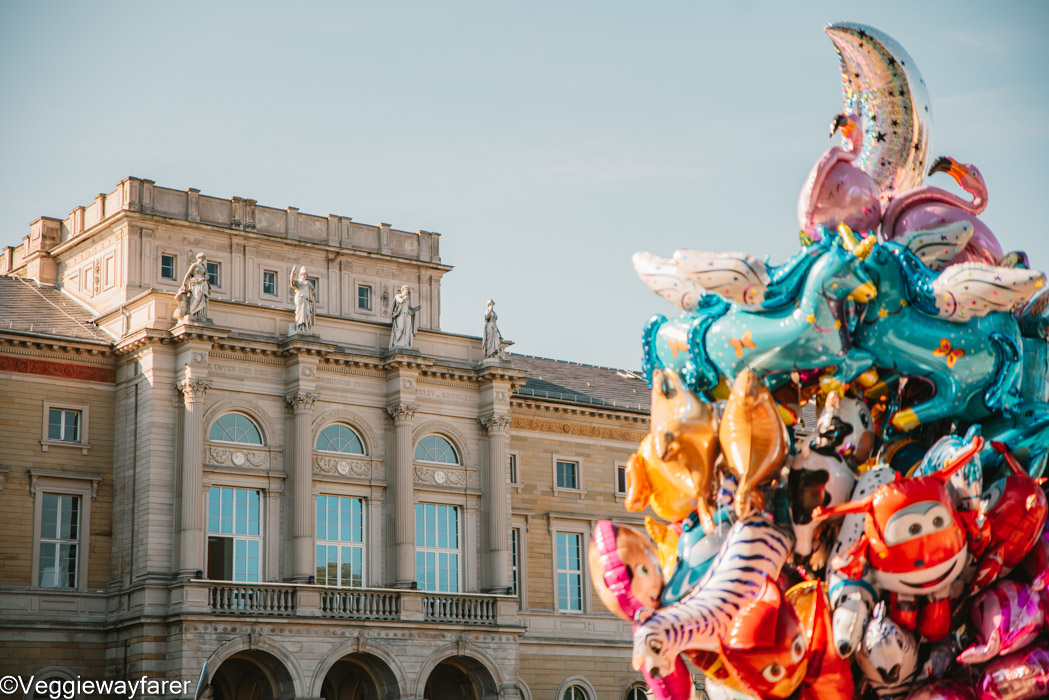
Eco-friendly tourism in Baden Wurttemberg
First was the expansion and improvement of the public transport system (bikes can be taken on trams for free), part of this plan was the introduction of the BW public transport ticket that covers the whole region in one simple ticket. Getting to other regions is easy too with the well-connected Deutsche Bahn, that is once you figure out how to buy tickets.
Next up, invest in proper bike infrastructure to the tune of a whopping 7000 kilometers of bike paths connecting cities and municipalities to each other around the state.
And finally, the region is actively pushing the use of local, organic ingredients and veering away from anything GMO. A few sustainable restaurants from the region will be highlighted further down in the article.
There are a lot of places to visit in Baden Wurttemberg, it is home to some of the most beautiful points of interest in Germany: Magnificent Castles, the Black Forest, medieval towns, and even crystalline lakes (Lake Constance). Use Karlsruhe as a base and take day trips to explore Baden Wurttemberg tourism which luckily has not yet been hit by mass tourism as some of its other counterparts in Germany.

What is there to do in Karlsruhe?
The city of Karlsruhe has a Karlsruhe Card which gives you free access to the network of trams & busses as well as a few select museums. This can be purchased online. Check out a few additional useful apps for traveling in Germany that might your trip even easier!
Put on a pair of comfortable walking shoes, bring a sustainable daypack and your reusable water bottle (to be filled at one of the many public drinking fountains), and let’s get exploring!
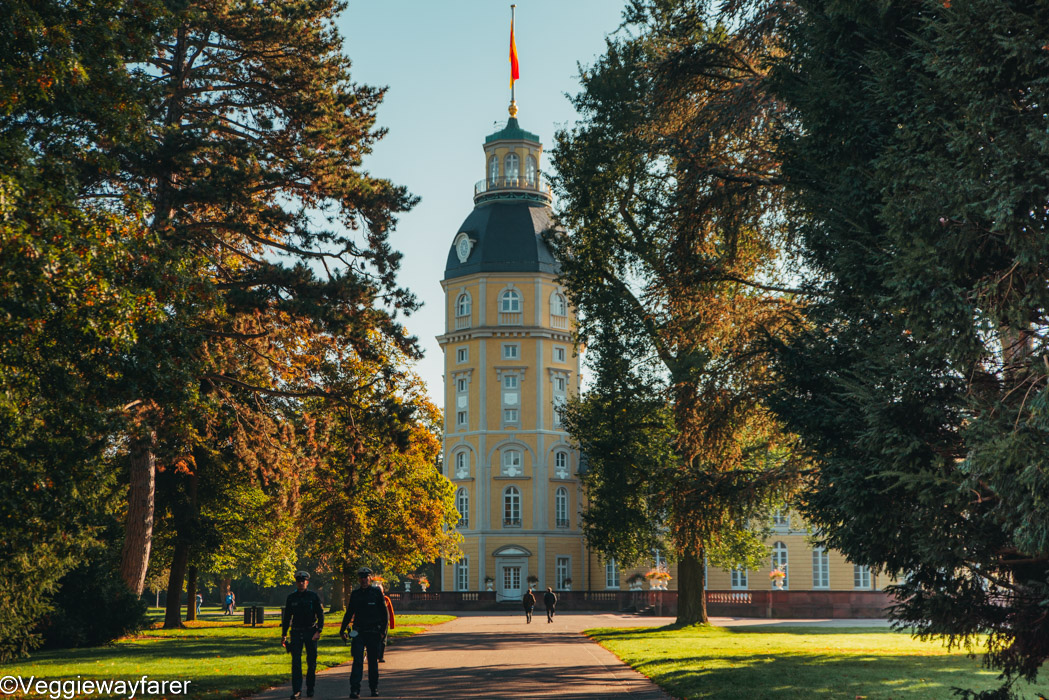
Walk around the 18th century Karlsruhe Palace and Gardens
The original palace dates back to the 18th century and was the home of the princes and dukes of Baden. In 1921 the palace became the Baden State Museum and no longer served as the home for the dukes and princes.
Sadly, WW2 took a heavy toll on the building, leaving it almost completely destroyed. Extensive renovations were done to rebuild the outside façade in the original style, the inside however was rebuilt with the museum in mind.
Entrance Fee: €4/ $4 (incl. in the Karlsruhe Card) for the Palace, the gardens are free.
Good to know: Looking for a good coffee? The only restaurant in the Palace Gardens serves a tasty espresso!

Explore Karlsruhe by biking in and around the Rhine River
The city strives to make getting around on a bike easy, even for those just visiting the city. A city tour of Karlsruhe on a bike is one of the best ways to get a feel for the city (weather permitting of course). In fact, the tourism office has plotted out a 48km round trip starting from the Karlsruhe Palace which will take you to the prettiest places in the city.
Get a map of the route in the tourist office or check online. Go out and rent yourself a bike through the bike-sharing system of the city of Karlsruhe.
Cost Price: €1 ($1) for 30 minutes on a normal bike and €2 ($2) for an e-bike.
Pick up and drop off the bike: One of the official drop-off points in the city is indicated on the online lap. The pickup location may be different from the drop-off location.

Ride the tram (or bike) to Durlach, an untouched borough of Karlsruhe
The borough of Durlach is located in the eastern part of Karlsruhe, roughly 8km from the Karlsruhe Palace. Durlach has origins that pre-date Karlsruhe and was in fact a separate city until 1938.
There are plenty of things to do in Karlsruhe itself that perhaps Durlach might not be possible due to timing. However, you would be missing out! The medieval alleyways, wooden colored houses, and Renaissance churches all have that small-town vibe to them making it a very different place from the center of Karlsruhe.
When viewed from above, the remnants of where the old city walls stood are clearly visible, now replaced by a highway that connects Durlach to the rest of Karlsruhe.
Where to buy a ticket: Buy your ticket at the ticket machine near the stop. Ticket machines accept coins. The ticket price is around €2.8 ($3)
Karlsruhe Card: If you have this card, you do not need to buy a separate ticket for the tram, as it is already included.
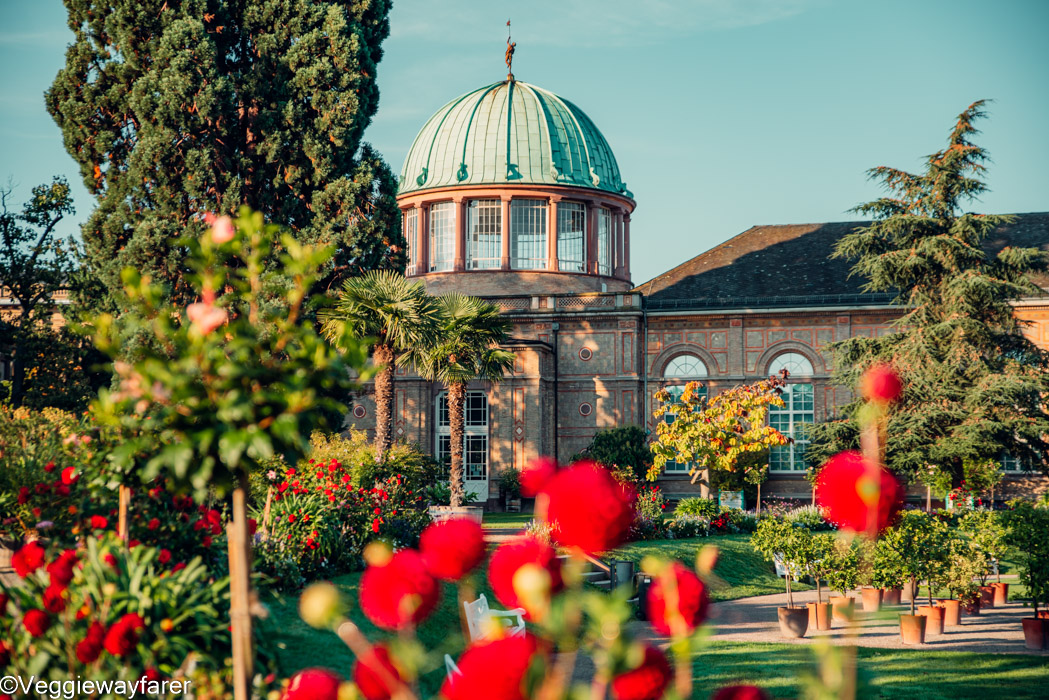
Stroll around the Botanical Gardens, one of the most peaceful things to do in Karlsruhe!
One of the top attractions in Karlsruhe is the (free) Botanical Gardens. The botanical gardens date back to the beginning of the 19th century and were built as a pleasure garden for the Margrave Karl Friedrich of Baden. Pleasure being the operative word, no expense was spared for the exquisite orangeries and greenhouses filled with all sorts of exotic fauna and flora. Some of which have survived today!
The impressive and colorful building surrounding the gardens now houses the State Art Gallery, the entrance for which is included in the Karlsruhe Card.
Entrance Fee: €3 ($3) for the greenhouses, the park itself is free.
Opening Hours Park: Daily 06:00 AM – 10:00 PM (in the winter 5:00 PM)
Opening Hours Greenhouses: Daily 10:00 AM – 6:00 PM
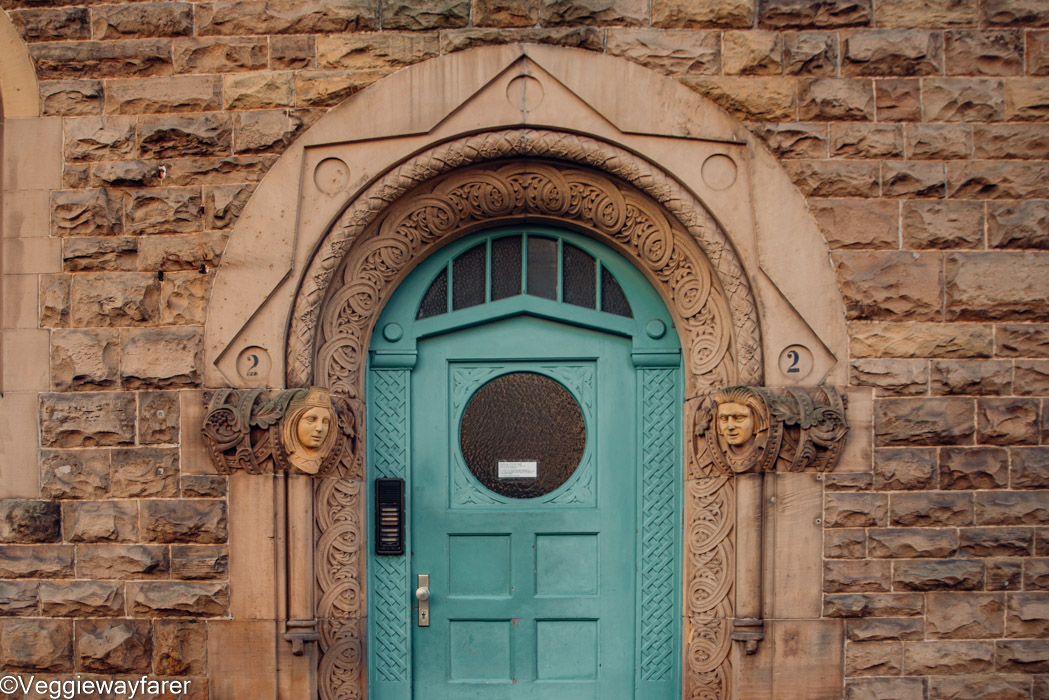
Spot the Jugendstil architecture
Karlsruhe is one of the most important cities in the south of Germany to see Jugendstil. Jugend what now? Most people will have only heard of Art Nouveau, Jugendstil is the German branch of Art Nouveau architecture. The style is categorized by its intricate designs often integrating elements of Fauna and Flora. It was used for interiors and exteriors of buildings as well as accessories around the house (lamps, tables,).
The city is peppered with beautiful examples of Jugendstil which you will no doubt see when biking/walking around. My personal favorite was the Lutherkirche and the Melanchthonstraße, a short street with impressive buildings completely built in the Jugendstil style
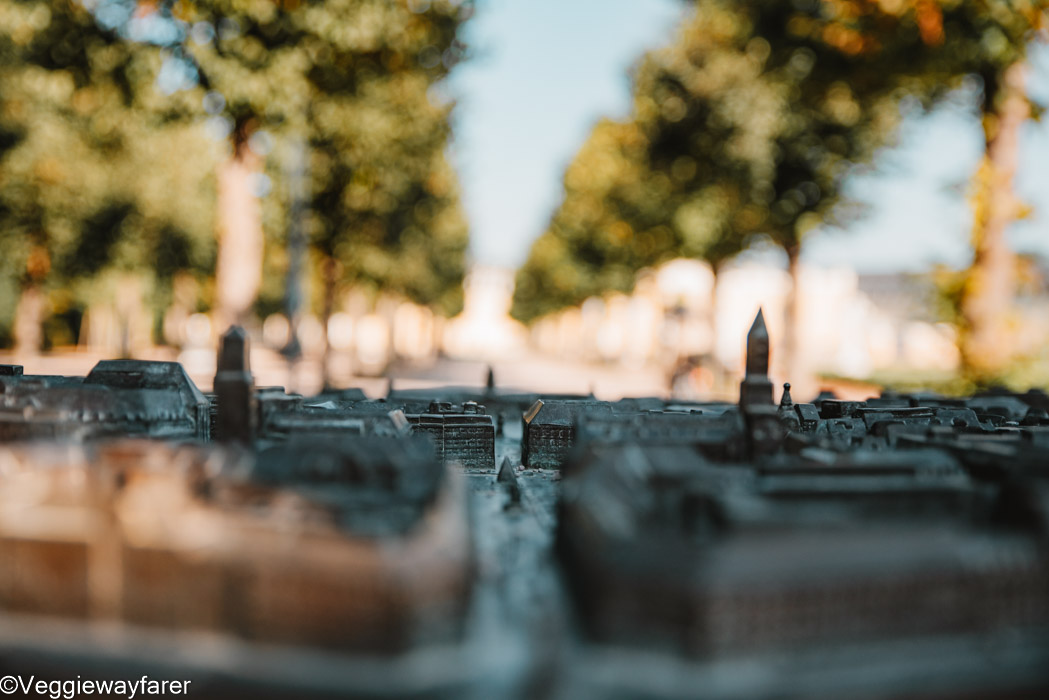
Day trips from Karlsruhe
There are a TON of beautiful landmarks in Germany and plenty of them are near Karlsruhe. We had but a short time to explore so chose to focus on some of the prettiest castles in Baden Wurttemberg for our day trip.
In all transparency, the castles are a bit harder to get to with public transport so you might consider renting a car to visit both the below castles. They are very near to each other (30 min drive) and can be visited on the same day.

Liechtenstein Castle
Getting there: 122 km from Karlsruhe (2h drive)
Address: Schloß Liechtenstein 1, 72805 Liechtenstein, Germany
Parking Fee: €2 ($2) – can be paid for by card at the restaurant/bar opposite the parking or in cash to the parking attendant
Probably one of the most well-known tourist attractions in Baden Wurttemberg although many visitors mistakenly think the Liechtenstein Castle is actually in Liechtenstein (which makes sense) or in Austria. A quick search on Google might leave you a bit perplexed. I know I was!
The fairytale castle perched atop a hill that is regularly seen on social media is actually in Germany, a 2h drive from Karlsruhe. It dates back to the 19th century and was built in a bit of an eclectic Gothic Revival style. With turrets in different shapes and colors, a drawbridge with a moat and a large inner courtyard. To this day the castle is privately owned by the Dukes of Urach.
A 30-minute guided tour of the castle is available in English and German at specific times during the day. This is the only option to see the inside of the castle. The inner courtyard of the castle can be visited without a guide.
Tickets and timetables for the tours can be found at the entrance of the castle.
Entrance Fee: Castle grounds and guided tour: €8 ($8.5); Castle grounds without the guided tour: €2 ($2). Only to be paid for in cash (no ATM on-site).
Opening hours: April to October: Daily 09:00 AM – 5:30 PM; February, March, and November: Saturday and Sunday only 10:00 AM – 16:00 AM; December and January: Closed

Hohenzollern Castle
Getting there: 132 km from Karlsruhe (1h30 drive) or 40 km from Liechtenstein castle
Address: D-72379 Burg Hohenzollern
Parking: There are two parking lots for the castle (P1 being closest to the castle). The fee for parking is included in the entrance ticket
One of the best places to visit in Baden Wurttemberg if you are looking to get a real feel of how royalty used to live. This castle is HUGE and perched atop a hill – aptly named Hohenzollern hill – making it visible from many kilometers away. It reminds me a little of some of the Hoeilaart Castle near Brussels, Belgium.
The current version of the castle dates back to the 19th century and was commissioned by Crown Prince Frederick William IV of Prussia. The architecture is a Gothic Revival style or rather dainty turrets meet robust medieval fort. Hohenzollern is one of the most visited castles in Germany, I might go as far as to say that it is one of the main points of interest in Germany.
You catch my gist, tickets to visit the inside of the castle need to be booked well in advance online.
Entrance Fee: €22 ($23.6) per person
Good to know: You can walk up to the castle from the parking lot, it is a steep 25-minute walk through a forested area. There are a few steps. Alternatively, you can opt to take the shuttle bus which stops at the parking lots and rides daily from 10.00 AM to 6.30 PM

Where to eat vegetarian in and around Karlsruhe
When imagining German cuisine, the word “vegetarian” might not spring to mind immediately. Rather feasts of sausage, pig trotters, pickled vegetables, and hearty mash might be more what you had in mind. That being said vegetarians in Germany do not go hungry, in fact, an estimated 6 million Germans are vegetarian.
As one of the main pillars to promote sustainability, the region of Baden Wurttemberg is focussing on promoting local produce and, to some extent plant-based living. I was lucky enough to try out a few restaurants that have managed to put a great spin on German (vegetarian) food that does not harm the planet. From growing their own produce to working with local suppliers and finding innovative ways to reduce waste, there are plenty of sustainable dining options that the rest of Europe could learn a great deal from.
My Heart Beats Vegan
Located just off the main shopping street, My Heart Beats Vegan has a wide range of pasta, salads, burgers, and cakes that are 100% plant-based. They have a menu with traditional German dishes, that have been recreated with vegan ingredients. The portions are large and the lovely terrace out in the back is great during the summer.
Address: Kriegsstraße 94 – 76133 Karlsruhe
Opening Hours: Monday to Friday 5:00 PM – 10:00 PM; Saturday and Sunday 12:00 – 10:00 PM

Tante M (for a snack)
Looking for a quick snack or to get in some small supplies then look no further than Tante M. This low waste shop has everything and more (snacks, household products, legumes, granola, apple juice made with local apples).
A large fridge near the back of the store holds some very good-looking (fresh) lunch options for taking away and a smaller fridge contains some delicious-looking cupcakes. If a snack is what you are after, simply fill up a reusable glass jar with some of the delicious sweet or savory goods that are on display. I assure you, there is something for everyone.
Tip: There are two locations, both of which are in a cool neighborhood to walk around and admire the Jugendstil architecture.
Address: Körnerstraße 26, 76135 Karlsruhe, Germany; Rintheimer Straße 1 76131 Karlsruhe
Opening Hours: Both locations are open Monday to Friday 09:00 AM – 6:00 PM and Saturday 08:00 AM – 2:00 PM

Erasmus Bio Fine Dining Restaurant
Erasmus was the first Bio Fine Dining restaurant in Germany. Ingredients that are used are bio-certified and working with local suppliers is part of the core ethos of Andrea and Marcello who are the respective owners, chefs, and hosts of the restaurant.
The cuisine is a mouth-watering combination of German and Italian traditions; lasagne & schnitzel proudly grace the pages of the mains on the Erasmus menu. Both vegetarian and non-vegetarian options are available, equally served with the utmost attention to detail in plates that are Michelin-worthy.
After dinner, Chef Marcello sits down with us and tells us their story over a glass of wine. He shares his love for cooking and for bringing traditional Italian recipes to life with locally sourced ingredients. The traditional flavors are kept (one does not touch the taste of a Parmigiana) but the shape and consistency are free to be played with. Certain ingredients are sourced from Italy (ex: The traditional Parmigiana) but the vast majority is from this very region.
Address: Nürnberger Str. 1, 76199 Karlsruhe, Germany
Opening Hours: Tuesday to Saturday 6:00 PM – 10:00 PM
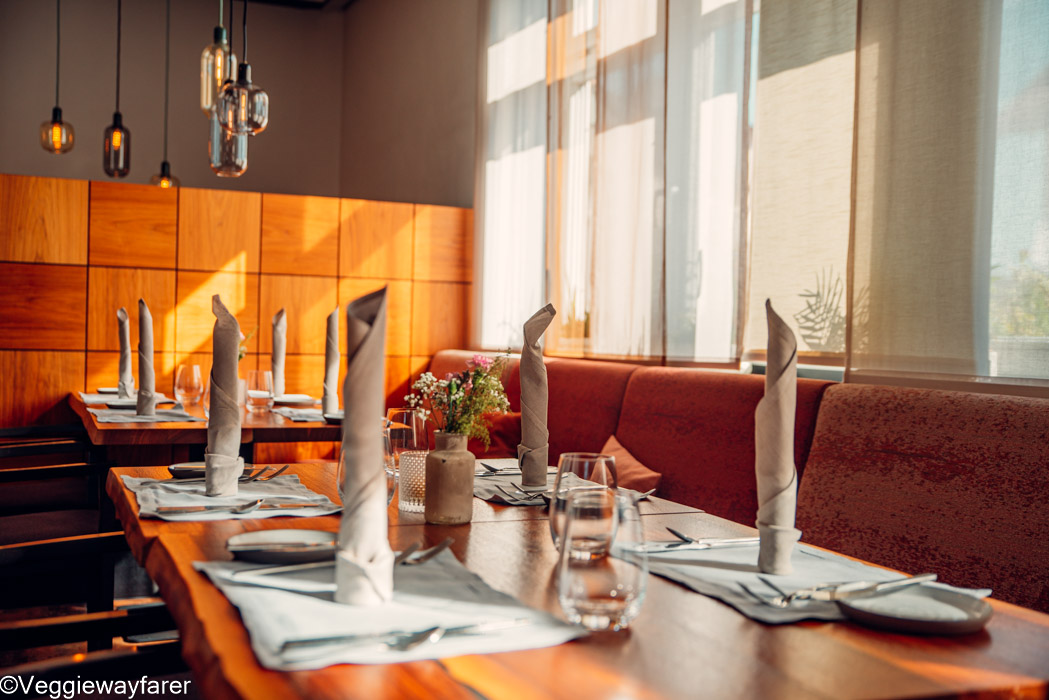
Bio Restaurant Rose and Bio fine dining Restaurant 1950
On your way to Liechtenstein or Hohenzollern Castle, you might want to make a pit stop to have lunch/dinner at this Bio restaurant. The idea for both the Bio Restaurant Rose and its younger sister the Bio Fine Dining Restaurant 1950 is simple: Nothing on the table (aside from the salt) comes from outside a radius of 25 kilometers.
Most of the vegetables are cultivated on a 3-hectare parcel of ground. Chef Simon gets creative by adding homegrown spices, transforming a seemingly limited variety of vegetables into an endless array of delicious dishes.
The newest restaurant to open on the premises is the Bio Fine Dining Restaurant 1950. This restaurant tries to take farm-to-table one step further and serves as an incubator for Chef Simons’s creative ideas. “I want to cook as sustainable and CO2-neutral as possible,” he says. Good to know is the premise has an electric charging outlet for cars.
Address: Aichelauer Str. 6, 72534 Hayingen-Ehestetten
Opening Hours: Check the various opening hours on the website

Where to stay in Karlsruhe
Bio Hotel and Restaurant Rose – Close to the Liechtenstein and Hohenzollern Castle.
If like me, you are looking for more eco-responsible ways to travel then choosing a Bio hotel might be the perfect answer.
BIO HOTELS have been around for 20 years and are the most sustainable hotel group out there. They are certified organic – being checked twice a year by control bodies. In 2023 all BIO HOTELS are aiming to be climate-positive and use 100% certified green electricity.
Schlosshotel Karlsruhe – In the heart of Karlsruhe
There is no BIO HOTEL in Karlsruhe itself but the next best thing is the Schlosshotel, located right on the edge of the Palace gardens. The hotel has a 24-hour reception, is conveniently located within walking distance of the main train station, and for those of you coming by car, it has a private parking lot in front of the hotel.
MORE TRAVEL RESOURCES FOR VISITING EUROPE
Belgium: 25 Places in Belgium that will knock your socks off
Belgium: 16 Castles in Belgium you can spend the night in
Germany: 7-day road trip through northern Germany in an electric car
Netherlands: 15 Day trips from Amsterdam you can take by train
Poland: Undiscovered Poland, a guide to the city of Lodz
France: Hidden gems in Eastern France, how to explore the Jura region
Luxembourg: 10 Reasons why Luxembourg should be on your bucketlist
A sustainable guide for things to do in and around Karlsruhe: Pin It
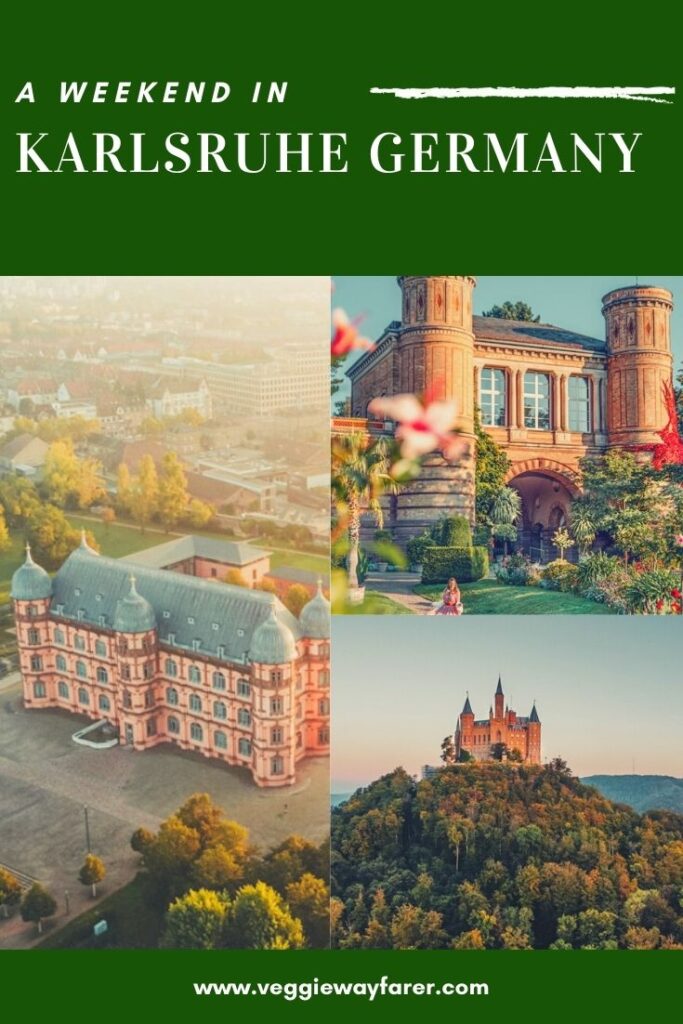


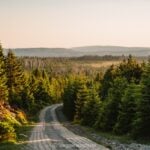



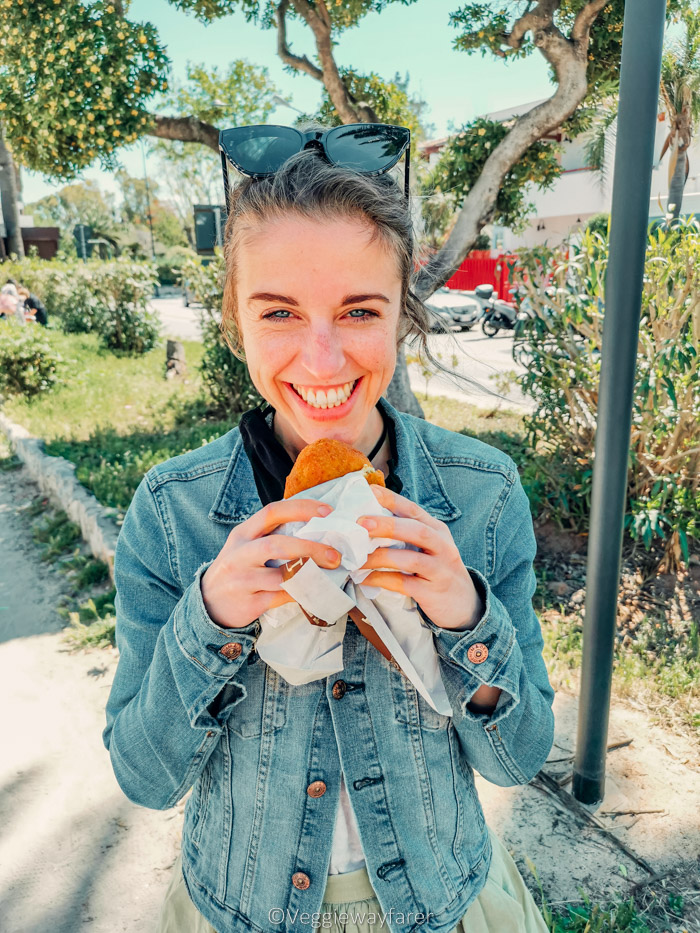


Most beautiful places and content..
So beautifully crafted information about Karlsruhe. I am planning to visit within a year